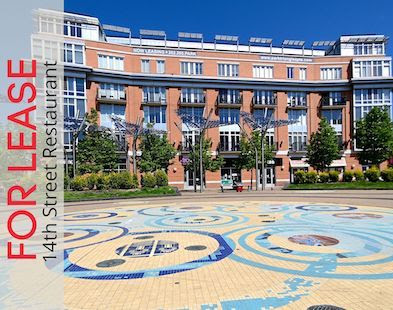Washington DC's tax sale is on. Well, almost. Registration for the District's tax sale auction for property in tax arrears begins on Monday, August 31, and ends September 4th, so don't delay - act now - to get your next house on the cheap. The auction of delinquent properties will take place starting Wednesday, September 9th, and continue until all
properties delinquent as of October 1, 2008, have been sold.
Property with less than $1,000 in back taxes may be put on the block to a willing bidder. So is this the place to pick up the home you thought you couldn't afford? Not really, says
David Kanstoroom, a title attorney with
North American Title. Because the District provides a statutory right of redemption (an American value, you know) for auctioned properties, wayward owners may pay the back taxes, penalties and interest, and in so doing reclaim the property. "A high rate of these properties - 90 plus percent - are ultimately redeemed by the original owner" says Kanstoroom. According to
Andrew Schechter of
M and M Search Service, a title search abstractor and auctioneer, the point of the auction is often not to obtain title to a property, but to invest in a distressed property and collect interest from the previous homeowner.
Auction participants, who technically purchase the lien on the property, not the actual title, are entitled by DC law to earn 1.5% interest,
per month, on the tax lien amount, to the homeowner that wants to redeem the property. Investors are therefore bidding on the amount of the tax lien, plus whatever surplus they determine the investment will justify.
Schechter notes that 4 months after the tax sale, investors can begin charging homeowners for actual title search costs, and 6 months after the tax sale they can begin charging "reasonable" attorneys' fees, a point at which the real money may kick in. Because the process is judicial, rather than administrative, the length of time to process the sale is determined by the court, but a case cannot be opened until 6 months after the tax sale.
Homeowners will still have to contend with penalties by the District, and any other outstanding liens, but according to Schechter, the District's intent is not to make tax sales an easy route to home purchasing. While it may be easier in Maryland, where the homeowner conducts the same type of transaction directly with the state, rather than a private investor, Schechter says the message from the DC government is simple: Don't attend the auction to pick up the home, go for the high interest accrued on the delinquent taxes. If its ownership you're looking for, you'll just have to go about it the old-fashioned way and search online.
The sale will be held at 941 North Capital Street, 4th floor.
 Hidden in the Tax Relief, Unemployment Insurance Reauthorization, and Job Creation Act of 2010, signed by the President on Friday, was a provision extending the $5,000 tax credit for first-time homebuyers in DC for another 2 years. The tax credit had expired at the end of 2009 and was renewed for 2010 and 2011.
Hidden in the Tax Relief, Unemployment Insurance Reauthorization, and Job Creation Act of 2010, signed by the President on Friday, was a provision extending the $5,000 tax credit for first-time homebuyers in DC for another 2 years. The tax credit had expired at the end of 2009 and was renewed for 2010 and 2011.
 The Federal tax credit is a $5,000 below-the-line credit against federal taxes for the purchase of a home in DC for taxpayers that did not own a principal residence in DC during the previous year. As happened this year, the credit usually expires and is renewed retroactively at the end of the year, leaving homebuyers a period of uncertainty about the tax ramifications of their purchase. The credit was tucked into the tax deal extending tax rates across the board to their current levels. The nationwide $8,000 tax credit for purchasing a home expired last summer.
The Federal tax credit is a $5,000 below-the-line credit against federal taxes for the purchase of a home in DC for taxpayers that did not own a principal residence in DC during the previous year. As happened this year, the credit usually expires and is renewed retroactively at the end of the year, leaving homebuyers a period of uncertainty about the tax ramifications of their purchase. The credit was tucked into the tax deal extending tax rates across the board to their current levels. The nationwide $8,000 tax credit for purchasing a home expired last summer. 




 After the Senate's approval yesterday (98-0) of the extended homebuyer tax credit, the House followed suit and passed H.R. 3548, which includes a tax credit amendment, putting the bill in the lap of President Obama who is expected to sign it into law. The bill extends the tax credit and widen its breadth to include more buyers, who now have until April to dither.
The new law will extend the $8,000 credit for first-time homebuyers who contract for a property by April 30, 2010 and settle by July 1. Unlike the current law, homebuyers that are not first-timers will get a $6500 federal tax credit, and raise the qualifying income from $75,000 to $125,000 for singles and from $150,000 to $225,000 for couples. In a small dose of fiscal restraint, Congress this time around capped the purchase price at $800,000.
After the Senate's approval yesterday (98-0) of the extended homebuyer tax credit, the House followed suit and passed H.R. 3548, which includes a tax credit amendment, putting the bill in the lap of President Obama who is expected to sign it into law. The bill extends the tax credit and widen its breadth to include more buyers, who now have until April to dither.
The new law will extend the $8,000 credit for first-time homebuyers who contract for a property by April 30, 2010 and settle by July 1. Unlike the current law, homebuyers that are not first-timers will get a $6500 federal tax credit, and raise the qualifying income from $75,000 to $125,000 for singles and from $150,000 to $225,000 for couples. In a small dose of fiscal restraint, Congress this time around capped the purchase price at $800,000.










